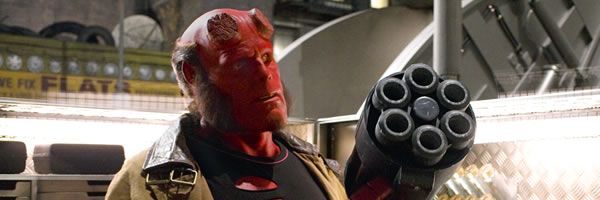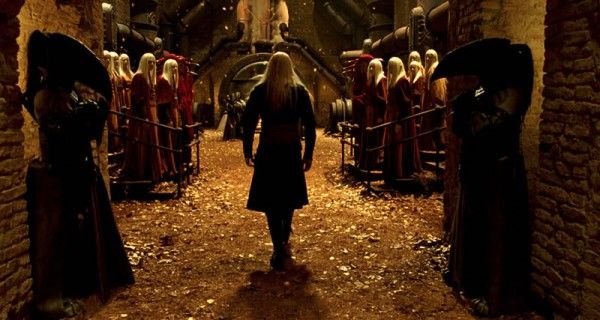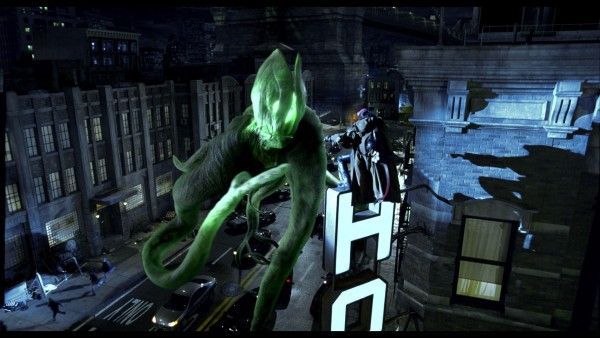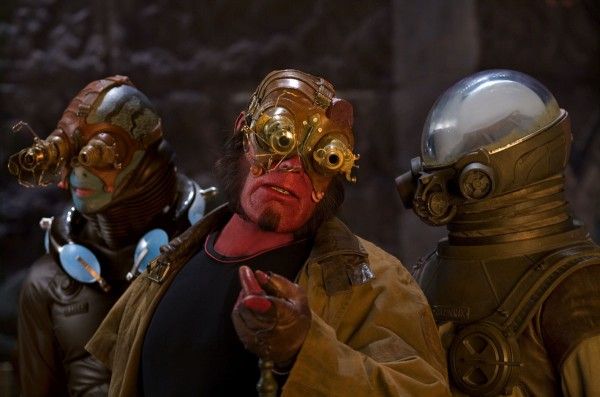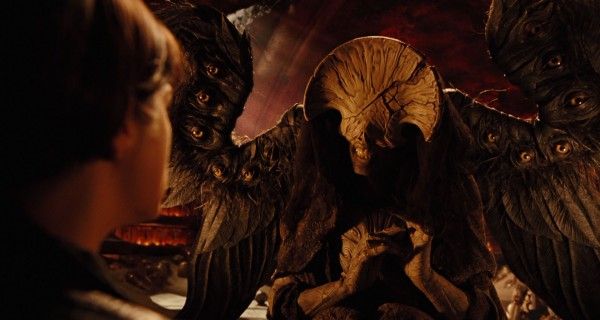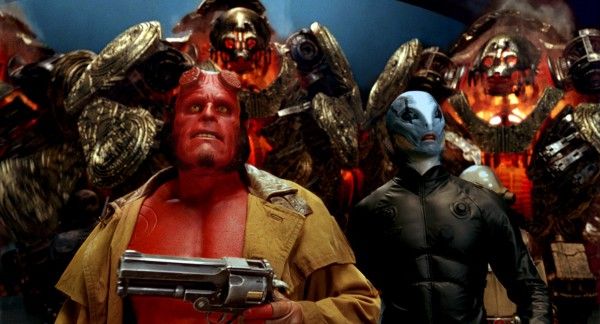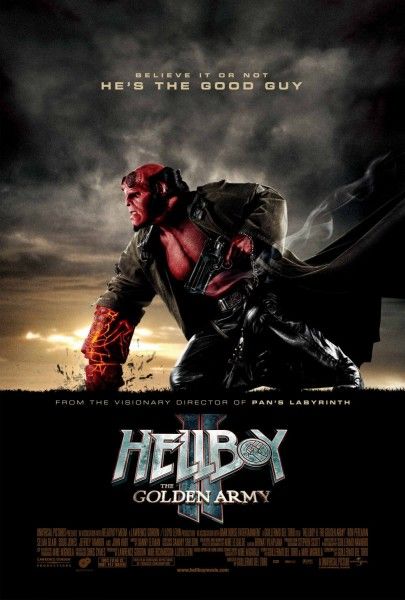[With Guillermo del Toro’s new movie Crimson Peak opening Friday, I decided to take a look back at the director’s filmography.]
When it comes to Guillermo del Toro’s filmography, Hellboy II: The Golden Army is just as marvelous as the critically acclaimed The Devil’s Backbone and Pan’s Labyrinth. While those Spanish-language films provide the safety of a historical lens for viewers who may not be inclined to take ghost stories and fairy tales seriously, Hellboy II is unabashedly del Toro going all-in to world-building mythos while staying true to his pessimism about mankind with monsters as the bizarre, unexpected hope.
Hellboy II exists because Hellboy did well enough on the home market to warrant a sequel and Universal, to their eternal credit, let del Toro do as he pleased. The restraints were off, and there was no tempering the sequel. Instead of trying to ease audiences in with an origin story and a friendly face, The Golden Army launches in with a jaw-dropping stop-motion animated prologue that hits at the heart of del Toro’s concerns regarding man’s weakness. “Man had a hole in his heart that nothing could fill,” the bedtime story goes, and so while Prince Nuada (Luke Goss) may be the film’s “villain”, he may also be right. Obviously, we’re not going to side with him, but at least his side has a clear point that’s beautifully represented by the gorgeous mythology that’s been crammed into an increasingly smaller space thanks to mankind’s rapaciousness.
For the sequel, del Toro draws the thematic lines in the clearest way possible, capitalizing on Hellboy (Ron Perlman) being kept a secret from a world he wants to join, a world that doesn’t want him. While it’s not a unique superhero narrative, it feels fresh because it’s based in del Toro’s fascination with how imagination in all of its forms is sanitized and destroyed. The elven king took pity on man, and mankind has greeted that mercy by relegating magical creatures to live underneath the sewer systems. We’re supposed to be on Hellboy’s side, but would we really welcome him?
Looking at del Toro’s filmography, it’s not simply that “magic = good” and “reality = bad”, or that he favors his monsters over people. Instead, the world is out of balance, and while the dictates of an action movie requires that the bad guys come from the monster side (Hellboy isn’t going to be fighting street punks), it’s a world where even the Tooth Fairies, who are damn scary, deserve some element of understanding and sympathy. They’re horrific little beasts, but they’ve been starved and cooped up, and they needed to feed. Del Toro may not be against humans, but he’s got a lot of compassion for his creatures, and Golden Army always strikes the right balance of trying to protect us while understanding that our “enemy” may not be evil.
This dynamic comes through most powerfully in the scene with the forest elemental, and Hellboy is forced to choose between sending a mythological species into extinction or saving a bunch of strangers. He chooses the latter, but it’s the rare set piece where the hero “wins”, but the scene is played for tragedy. The forest elemental is dangerous, but it’s also beautiful. It’s blood causes things to grow. The music is sorrowful hen the creature dies. We’re asked to consider if we’re worth saving, and that’s an uphill battle.
The fight becomes even tougher when you look at how weird del Toro’s willing to be. I wish every studio took the chances Universal did with Golden Army because the movie isn’t just surprisingly sad; it’s also downright bizarre in the best ways possible. While it still slumps a bit in the middle like the first movie, at least here it feels like pausing for breath while the heroes recollect and take a moment. That leads to a scene where Hellboy—a demon destined to bring about the apocalypse—and Abe Sapien (Doug Jones)—a telepathic fish man who eats rotten eggs—get drunk on cheap beer and sing “Can’t Smile without You”. This movie should not exist, but I’m so happy it does.
Because this weirdness is where great cinema thrives. I wish directors always had the money to create these kinds of bizarre gems, and Hellboy II manages to be deeply sorrowful at times and batshit insane at others, but it absolutely works because del Toro knows mythology and he knows people. He puts in lovely little touches like Abe putting in contact lenses so he’ll look handsome for Princess Nuala (Anna Walton), the dark jokes like the “baby tumor”, and the love story between Hellboy and Liz (Selma Blair), which provides not only a nice character arc for the two characters, but also the thematic crux of the film.
Before the final battle, Hellboy, Liz, Abe, and Johann Krauss (Seth MacFarlane) make a detour that basically set up a third Hellboy, but also tries to look at the long view of man’s weaknesses running up against the downfall of imagination, which includes all of its terrors and wonders, stunningly represented by the Angel of Death (Doug Jones). The Angel of Death asks Liz is she’s willing to damn all of humanity if it means saving Hellboy, and she answers yes. It’s a pure expression of humanity’s love representing both selfishness (she’ll be responsible for destroying the world) and selflessness (she’ll bear that burden), and Hellboy III would have presumably followed through on this process.
The cost of this scene means that the ending makes no sense since the Angel of Death removes the spear-tip from Hellboy, thus negating the reason for the group to confront Nuada and give him the final piece of the crown. He has nothing they want, and he won’t hurt Nuala because it would mean hurting himself. It’s a final confrontation because the movie needs a final confrontation, and its saving grace (aside from the well-choreographed action) is that it ends in the same tragic fashion as the battle with the forest elemental—the age of mythology ends to make way for the humans. We lose both what’s dangerous (Nuada) and what’s beautiful (Nuala), and for del Toro, the two are inseparable. We’ve either sanitized or destroyed the magic in the world, and so while the heroes are “victorious”, there’s still a sense of loss.
The only way for the freaks to survive with humanity is to leave us to our own devices, and once again, I admire that Hellboy II sides with the outsiders rather than try to reward them with acceptance. Rather than serve the establishment (BPRD) and mankind, the heroes decide to go off into an uncertain future. And then it all ends with a wink as Hellboy learns that he’ll be a proud papa to not just one kid, but twins. It’s defiance mixed with a smirk, and no other blockbuster has dared to be so weird and endearingly unusual from start to finish. It’s a movie with all of del Toro’s personality and thoughtfulness that refuses to run to safety.
Unfortunately, del Toro would spend the next five years in the wilderness, bouncing from The Hobbit trilogy, which was stuck in rights limbo before moving to an adaptation of At the Mountains of Madness, which also never got a green light. When he finally got back behind the camera, it was time for some good, old-fashioned giant monsters fighting giant robots.
Tomorrow: Pacific Rim
Other Entries:

